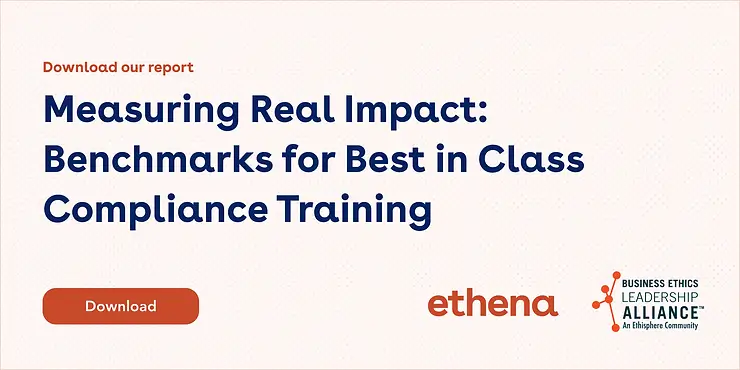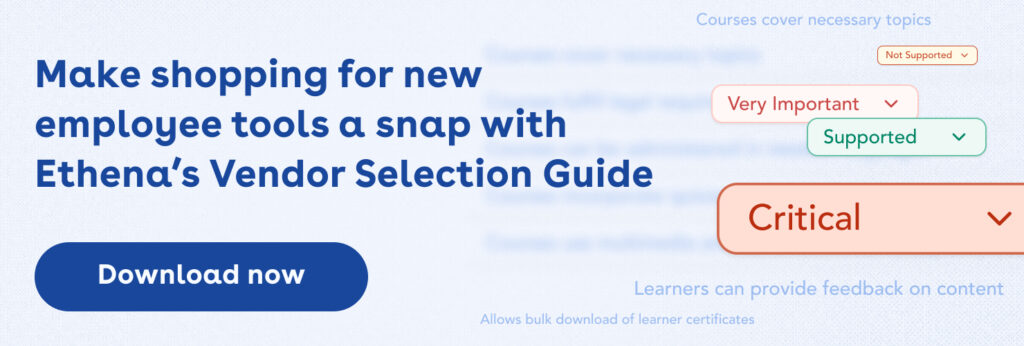We’ve said it before, and we’ll say it again: getting an entire organization to, and maintaining, compliance is no simple task. If you’re reading this, odds are you’ve been training in (or written the training materials for) your organization’s guidelines, code of conduct, various compliance trainings, and more as a part of a healthy compliance program. And although each workplace’s compliance programs may differ, they all aim to satisfy the needs of the organization and the rules and regulations set by various government agencies.
As an organization grows, changes, and brings on new employees, it’s likely to assess whether or not the organization is complying with every regulation successfully: when this process is handled formally by a third-party auditor, this is known as a compliance audit.
Below, we’ll break down exactly what a compliance audit is – including other common types of compliance-related assessments your team can tackle – and how you can best support your compliance program with the right software.
By the way, if you’re on a compliance or HR team and don’t know where to start, we suggest you check out our previous post on Best Practices for Easy HR Compliance, which contains a checklist that can help you make sure you’re covering all your compliance bases.
Let’s dive in!
Compliance audit vs. internal audit vs. operational audit
The words “compliance audit” have a tendency to get tossed around when an organization begins looking over its compliance program, but since there is such a thing as a formal “compliance audit,” we should point out the difference between the three main types of compliance-related audits out there.
The main thing to keep in mind is, unlike an internal or operational audit, a compliance audit is a formal process handled by a certified, third-party auditor.
Compliance audit definition
A formal compliance audit is an external process, rather than one that an organization might handle internally. Essentially, an organization locates an acceptable compliance auditor that has relevant expertise in the specific compliance areas relevant to the company. Often, an auditor will provide the organization with preparatory materials, like a checklist, before requesting the documentation needed to assess the organization’s compliance program. Depending on the organization, the auditor may also work on-site to work through the documents, observe workplace practices, dive into things like security and infrastructure, and interview employees of various levels in order to complete their assessment.
Once the audit is completed, the auditor will present the organization with a report that outlines the strengths and weaknesses of the compliance program as well as some immediate recommendations to address any potential areas of risk. From there, the organization should expect to address and solve any compliance issues over the next 3-4 months (within 120 days). Some compliance auditors may also have a follow-up visit to verify that the organization has made the necessary changes to achieve compliance.
In a loose sense, you can think about a formal compliance audit like the health inspector at a restaurant, walking through every area of your favorite dinner spot, ensuring the food is cooked and the dining area is cleaned safely. (And much like a health inspector, it’s okay if the first pass through isn’t up to par; an audit is a great chance to improve your internal procedures and keep that coveted A grade!)
Internal audits
An internal audit is, on the other hand, administered by an organization’s own team, but with similar goals in mind. Internal audits are conducted by an internal team of employees, often on a regular basis, to identify compliance and security risks and make sure the organization is keeping in line with company guidelines.
Unlike a compliance audit, internal audits are specific to the needs of the organization and are not limited to compliance regulations alone. Internal audits are often structured to regularly check in on company processes and strategies as they relate to organizational goals and provide recommendations for improvement as the company grows and changes over time.
Operational audits
Another type of internal audit, operational audits are handled by an organization, without the need for a third party. An operational audit is used to measure specific departments or procedures of an organization in order to assess whether or not they align properly with the policies, values, and goals of the organization.
Why do compliance audits matter?
In a very simplified sense, compliance audits are there to keep an organization operating safely and fairly. Compliance is an area that an organization cannot afford to cut corners on, and teams that embrace best practices and strive to make their company more efficient, ethical, and safe for their employees and customers know that a good compliance program is well worth the potential cost.
Organizations that practice excellent, healthy compliance practices:
- Keep their employees informed, aware, and safe. An employee who’s well-trained in the necessary compliance regulations is far less likely to make a compliance violation unknowingly, and they’re more likely to help one another out when they witness potential wrongdoing. And, when things do go wrong, employees can lean on their compliance program to know how to report and address issues as they arise.
- Stay on top of compliance regulations and protect their business from penalties. If you’ve caught a company scandal in the news over the past few years, odds are you’re witnessing an organization’s very public lapse in proper compliance. Companies that cut compliance corners (say that three times fast!) to focus on making a quick profit open themselves up to federal fines, pricey legal processes, and reputational ruin. Regular compliance audits, internal and external, are there to point organizations in the right direction.
- Are a better place to work. No one wants to work somewhere they feel unsafe. Compliance regulations, as unfun as it sometimes feels to follow the rules, are there to provide structure for an inclusive, respectful, safe, and fair workplace. Believe it or not, happy and safe working conditions attract and retain the best employees out there.
How great compliance training can support your next compliance audit
Is there a way to save time and money, all while ensuring your team is better prepared for their next compliance audit? The answer lies in the backbone of a compliance program: training. An organization with a great compliance training program has teams that are much more prepared for when compliance risks occur. Plus, good training content can support a culture with better communication, inclusive values, and provide reporting resources when employees need them most.
But great training often comes with a major price: time, money, and overall work from your compliance or HR teams. Is there a way to have the best of both worlds?

Enter Ethena: the ideal training partner to help you with compliance audits
Ethena’s training platform is designed to make training effective, easy to use, and convenient for employees and compliance teams alike. With HRIS integrations and an automated delivery system, Ethena delivers user-specific compliance training to employee inboxes, even automatically onboarding new hires. Ethena even automatically sends reminders on your behalf, saving administrators days of work every quarter (and saving you enough time for a regular compliance audit). Ethena’s administrator platform tracks learner completion and engagement data, allowing administrators to keep track of employee training from the big numbers to the little details.
And, with out-of-this-world training content, featuring audio options, graphic novels, bespoke videos, and more, Ethena makes training with today’s teams in mind. With over 1M pieces of positive feedback from Ethena’s 80,000+ users, Ethena’s platform boasts a 92% overall positivity rating – in other words, our learners love our content!
Are you interested in learning more about how Ethena can save you time and money on your compliance program? Let’s get in touch. And if you want to see what all the hype is about, try a sample of our training for yourself!











